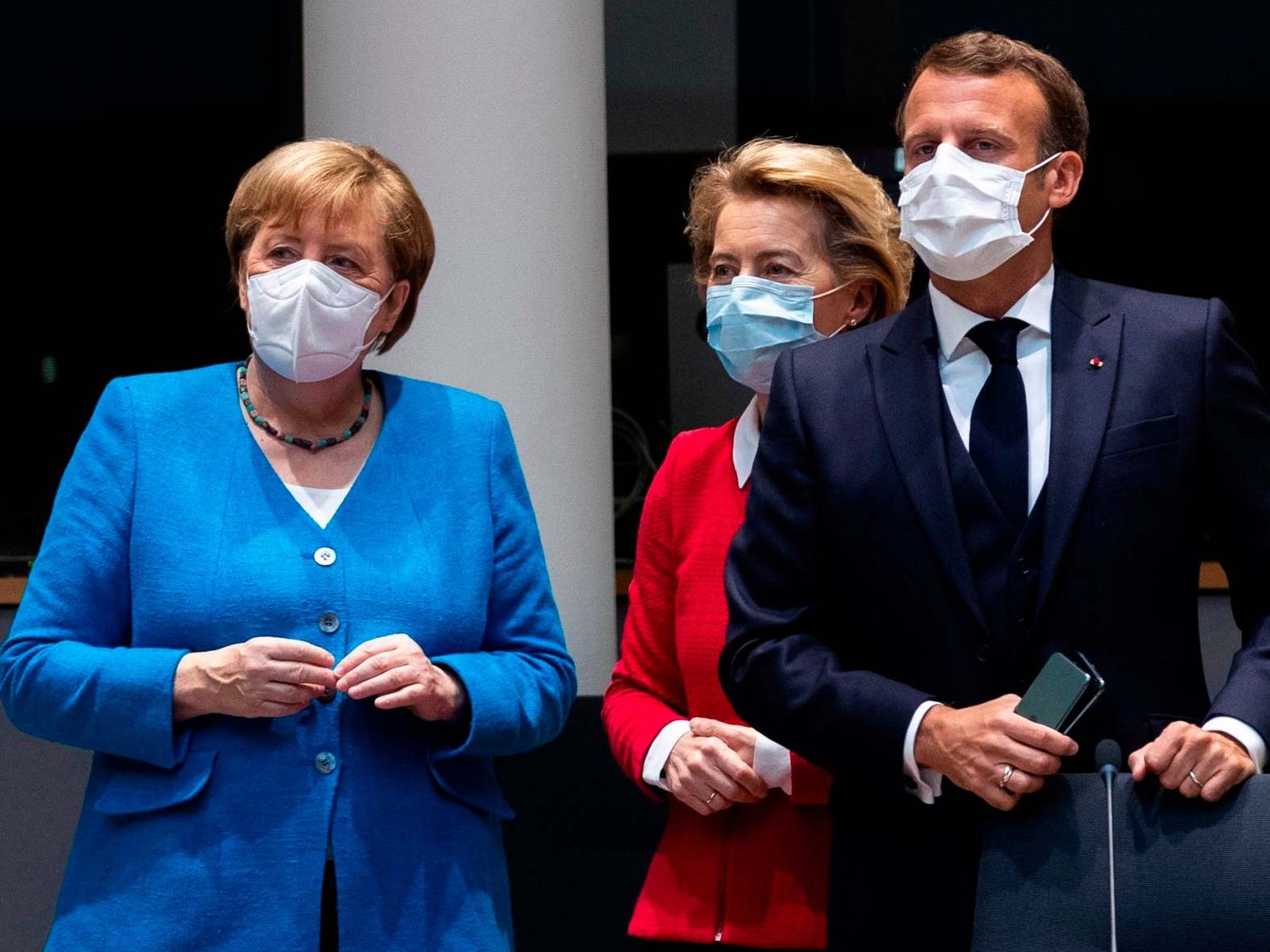Coronavirus reveals another example of EU disarray
Sean O’Grady looks at how the recovery package for Covid-19 has caused another rift in the bloc


In their uniform white face masks, the leaders of the European Union look a little like anxious doctors conferring on how to treat a sick patient, some favouring a larger dose of medicine, some a smaller one, others still wondering whether other treatments might be preferable.
It is an apt image, given they spent a mammoth 100 hours trying to find a consensus about how the European economy, in a severe recession, should recover from its brush with Covid-19. Specifically, the discussions, which took several days – the longest summit since the Nice constitutional marathon in 2000 – concern how the €750bn package of coronavirus recovery loans to the weaker, harder-hit economies, such as Italy and Spain, should be structured. Should the liability to repay the loans to borrowers be the responsibility of the EU as a whole, which is issuing and backing them; or fall more directly on the nation states actually receiving them? The question is fundamental, and the arguments show both the strengths and weaknesses of the European Union.
At the moment the weaknesses are the more dramatic feature of events. The most glaring is a lack of European solidarity. The “frugal four”, being a more fiscally conservative group led by the Netherlands with Austria, Denmark and Sweden, all wealthier northern members, object to what economists call “moral hazard”; that their taxpayers would be liable for a default on a loan by another country, usually cited as Italy.
Whether they are right or wrong it highlights the problem that Europe has instituted a political and partial monetary union, but not the fiscal union that usually accompanies the other two. Indeed two states in the frugal aren’t even members of the single currency, the money the giant Euro-debt is to be denominated in, adding to the complication. The absence of a fiscal union means such bond issuance to deal with crises, including banking crises, has to be constantly negotiated; there is no EU Treasury ready to issue the IOUs on behalf of all governments as a bloc. The European Central Bank does do some of this work of injecting money into economies, but it is independent and has its own mandate (and not all EU states have fully joined the euro).
By the way, the Frugal Four, small to medium-sized powers, might once have looked to Britain and Germany for heavyweight political support in the face of such demands. However Britain has gone, and Germany plainly thinks getting past the Covid recession transcends the usual instinct for prudence and restraint.
The issue joins a series of other unwelcome examples of European disarray: Brexit, most obviously; the migrant crisis; the defiantly nationalistic and authoritarian governments in Hungary and Poland; the weakness of the banks, especially in Italy; the EU budget; and the rise of Eurosceptic radical movements of the right and left in almost every country, with some in government.
Fundamentally though the issue is political and social. Whereas if some natural disaster hit one province of the Netherlands, say, no one would begrudge the Dutch government borrowing money for rebuilding, the analogy evidently does not hold for flows of hard-earned cash across European frontiers, especially when in the direction of the Mediterranean. They are heartily resented.
Yet the EU, part nation state, part club, part Tower of Babel, is still standing. The member states, and their populations, may not always love it, but it seems they cannot live without its economic benefits – that of movement and the single market that works so well for Europe’s still mostly prosperous peoples. Even the most disgruntled countries wouldn’t actually leave, as the UK did.
If the EU really was disintegrating, such an initiative as the corona bond wouldn’t even be considered. The EU doesn’t seem to have emerged from a bit of a crisis of confidence. During the first stages of the pandemic, the European Union barely functioned at all. To the dismay of the European Commission President, Ursula von der Leyen, each member state pursued their own interests. Borders were closed, travel bans imposed and the Schengen Agreement suspended – all by national governments. Italy pleaded for help, but was dissatisfied with the response. The Commission was marginalised. Public health was mostly a national competence, illogically given that a virus doesn’t respect borders.
Now, though, habits of economic cooperation have re-emerged. Post-Brexit, the old Paris-Berlin axis has reasserted itself, because it has had to. Angela Merkel has postponed her retirement to offer the continent some firm, visionary leadership, as she did in Germany during the migrant crisis. Her seniority, (chancellor since 2005), and the heft of her country’s economy allow her to do so. With Emmanuel Macron she is keeping the EU relevant and giving it some new sense of purpose. Until the next crisis, at any rate.
Join our commenting forum
Join thought-provoking conversations, follow other Independent readers and see their replies
Comments